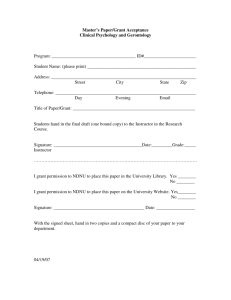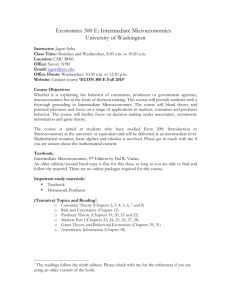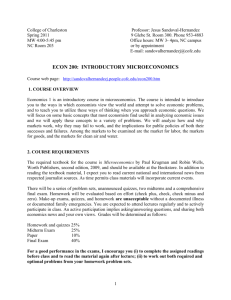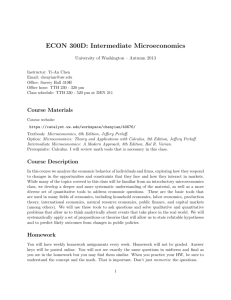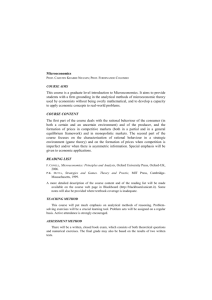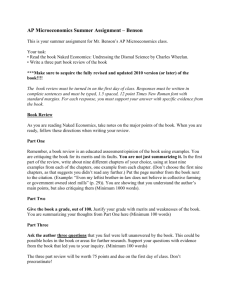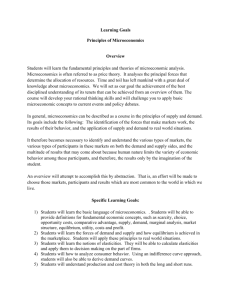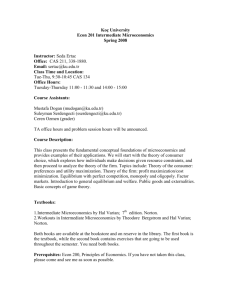Economics 2103 – Principles of Microeconomics
advertisement
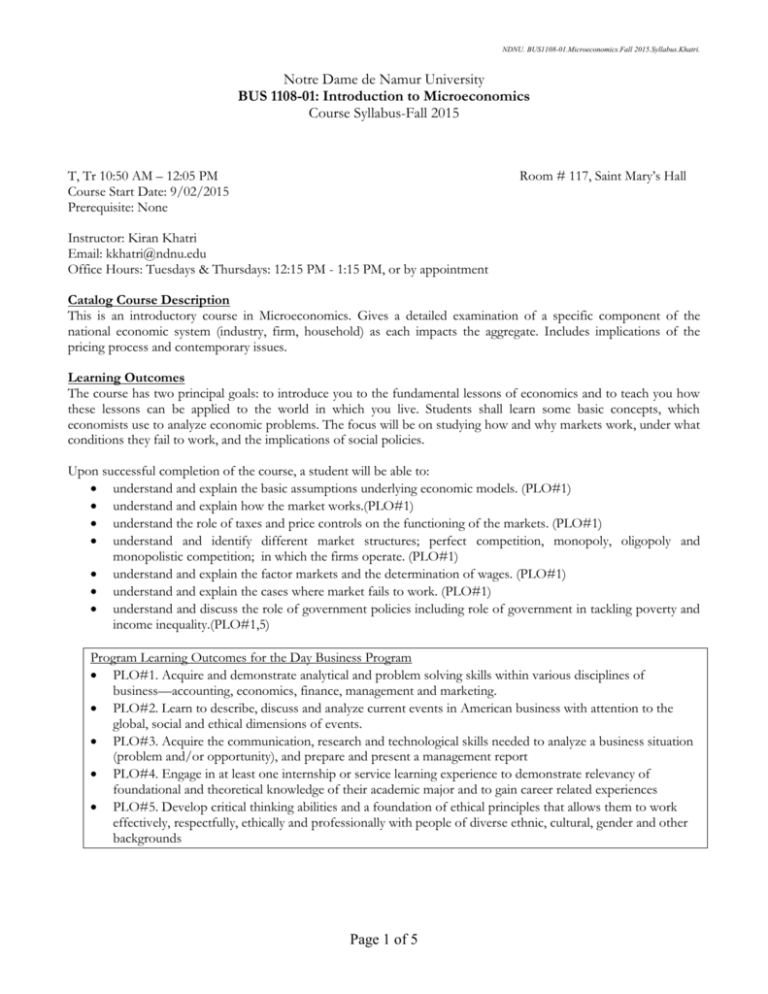
NDNU. BUS1108-01.Microeconomics.Fall 2015.Syllabus.Khatri. Notre Dame de Namur University BUS 1108-01: Introduction to Microeconomics Course Syllabus-Fall 2015 T, Tr 10:50 AM – 12:05 PM Course Start Date: 9/02/2015 Prerequisite: None Room # 117, Saint Mary’s Hall Instructor: Kiran Khatri Email: kkhatri@ndnu.edu Office Hours: Tuesdays & Thursdays: 12:15 PM - 1:15 PM, or by appointment Catalog Course Description This is an introductory course in Microeconomics. Gives a detailed examination of a specific component of the national economic system (industry, firm, household) as each impacts the aggregate. Includes implications of the pricing process and contemporary issues. Learning Outcomes The course has two principal goals: to introduce you to the fundamental lessons of economics and to teach you how these lessons can be applied to the world in which you live. Students shall learn some basic concepts, which economists use to analyze economic problems. The focus will be on studying how and why markets work, under what conditions they fail to work, and the implications of social policies. Upon successful completion of the course, a student will be able to: understand and explain the basic assumptions underlying economic models. (PLO#1) understand and explain how the market works.(PLO#1) understand the role of taxes and price controls on the functioning of the markets. (PLO#1) understand and identify different market structures; perfect competition, monopoly, oligopoly and monopolistic competition; in which the firms operate. (PLO#1) understand and explain the factor markets and the determination of wages. (PLO#1) understand and explain the cases where market fails to work. (PLO#1) understand and discuss the role of government policies including role of government in tackling poverty and income inequality.(PLO#1,5) Program Learning Outcomes for the Day Business Program PLO#1. Acquire and demonstrate analytical and problem solving skills within various disciplines of business—accounting, economics, finance, management and marketing. PLO#2. Learn to describe, discuss and analyze current events in American business with attention to the global, social and ethical dimensions of events. PLO#3. Acquire the communication, research and technological skills needed to analyze a business situation (problem and/or opportunity), and prepare and present a management report PLO#4. Engage in at least one internship or service learning experience to demonstrate relevancy of foundational and theoretical knowledge of their academic major and to gain career related experiences PLO#5. Develop critical thinking abilities and a foundation of ethical principles that allows them to work effectively, respectfully, ethically and professionally with people of diverse ethnic, cultural, gender and other backgrounds Page 1 of 5 NDNU. BUS1108-01.Microeconomics.Fall 2015.Syllabus.Khatri. Required Text: Principles of Microeconomics, N. Gregory Mankiw, 7th edition. Cengage, 2015 ISBN-10: 128516590X ISBN-13: 978-1285165905 Study Guide (Optional): Study Guide Accompanying Mankiw's Principles of Microeconomics, David R. Hakes, Cengage 2015 ISBN-10: 1285864247 ISBN-13: 978-1285864242 Additional student resources can be found at: http://www.cengagebrain.com/shop/ISBN/9781285165905?cid=APL1 Coursework Details The coursework is spread across 17 chapters. Beginning with the basics of economic theory, the course progresses to discuss introductory concepts of how markets function and basic economic units. The course then advances to discuss the economic behavior and decision making processes for individual economic units. Broader concepts such as public goods and taxation are also included in this course. There will be a total of 3 exams during the course as follows: Midterm I: Chapters 1, 2, 4, 5, 6 Midterm II: Chapters 7, 8, 10, 11, 13 Final Exam: Chapters 14, 15, 16, 17, 18, 19, 20 Each student will be allowed to bring in a note-sheet (2 sides) for each of the three exams. No books are allowed. Refer to attached schedule for tentative course coverage. Home-works will be given regularly and will be primarily text based. No late submissions will be accepted. Nonsubmissions will result in zero points for the same. Besides grades, the home-works will be good practice for tests. Home-works and tests may contain questions in the form of short answer questions, economic reasoning, analyses, multiple choice questions, tables and graphs or a combination of these. Students are free to work on the home-works by themselves or in groups with size not exceeding 3 in each group. A group needs to make only one submission. Always remember to include names of team members. Points will be given to only those students whose names are on a submission. Names will not be added after a submission is made. It is not mandatory to have same team members for each submission. Grading of home-works will be based on completion, accuracy and relevance. Home works will cover all relevant chapters. Several relevant/practice exercises and work will be given in class that will also be graded. Sometimes students may need to take the remaining work home and bring them back in the next class for points. In essence, there will be some graded work for you to do throughout the semester. Regular attendance and timely completion of work are key to successful completion of this course. Page 2 of 5 NDNU. BUS1108-01.Microeconomics.Fall 2015.Syllabus.Khatri. Grading System The following grid will be used to grade your performance in class. Grading will be done on a continuous basis and will be shared with you so you know how you are faring in the course. Campus portal will be used for information sharing but continuous grade updates will not uploaded to campus portal. Grading Description Home-work Class-work Midterm I Midterm I I Final Exam Attendance Total Weights Approximate Points 30% 20% 15% 15% 15% 5% 100% 15 X 30 = 450 points 12 X 25 = 300 points 1 X 225 = 225 points 1 X 225 = 225 points 1 X 225 = 225 points 3 X 25 = 75 points 1500 points Our classes will be highly interactive. I encourage every student in the class to open up and come forward with her/his ideas and make the classes lively rather than the instructor having to lecture all the time. Letter Grade Determination: Percentages 93-100 90-93 88-90 83-88 80-83 78-80 Grade A AB+ B BC+ Percentages 73-78 70-73 68-70 63-67 60-63 0-60 Grade C CD+ D DF Workload: In addition to class attendance, every class includes an estimated workload of six or more hours per week outside of the classroom. Distribution of Average Weekly Hours of Instruction/Study = Total of 9 Per Week Class Contact Hours: 3 Text Readings and Note Taking 2 Writing Assignments 2 Studying For Quizzes and Exams 2 Total Number of Hours per Course 135 Course Policies Attendance: Students are expected to maintain complete attendance and sign on an attendance roster each session. While students get points for attendance that adds up to final grades, all unexcused absences will lead to loss of attendance points. Coming in late to class will be marked as 'tardy'. Five tardies will result in one class absence. All excused absences will have to be communicated to the instructor in advance or at the earliest possible supported by documentation and non-documented absences will be treated as unexcused absences. Ten or more unexcused absences will result in getting zero points for attendance. Students are responsible to cover materials missed in class due to any absence. The use of electronic devices are restricted in the class unless used for taking notes or reviewing PowerPoint Slides. Please bring in your own calculator. Use of cellular phones is prohibited in class. Please access University web pages at: http://www.ndnu.edu/academics/catalog/undergraduate-policies/ for details on University policies and procedures. Page 3 of 5 NDNU. BUS1108-01.Microeconomics.Fall 2015.Syllabus.Khatri. Important Dates and Other Information Please consult the syllabus attachment for additional relevant information. Specifically, please note that if you stop attending this course, you should officially withdraw from it as soon as possible to avoid receiving an unnecessary failing grade. You can find the University calendar at this link: http://www.ndnu.edu/academics/academiccalendar/2015-2016/ Students are responsible for meeting requirements of the syllabus calendar. Any confusion should be immediately discussed with the instructor. Any losses pertaining to lack of careful consideration of the calendar details will not be made up in any way. Academic Honesty NDNU is committed to the maintenance of the highest standards of integrity and ethical conduct of its members. The same level of ethical behavior and integrity will be maintained in this course. Participating in a behavior that violates academic integrity (e.g., plagiarism, cheating in examination, helping another person cheat, having unauthorized advance access to examinations, and fraudulently altering academic records) will result in your being sanctioned. Violations may subject you to disciplinary action including the following: receiving a failing grade on an assignment, examination or course. Please refer to the Student Handbook for more details. Learning and Other Disabilities: If you have a learning disability or other circumstance that requires accommodations in this class, you must bring it to the attention of Program for Academic Support and Services (PASS) to arrange for possible accommodations (650508-3670). Please note that while every possible effort will be made to adhere to the course schedule, it is subject to change under unavoidable circumstances. Should there be a need for such adjustments; students will be notified adequately ahead of time. Also, there will be revision sessions in class prior to the mid-terms and final exam. Page 4 of 5 NDNU. BUS1108-01.Microeconomics.Fall 2015.Syllabus.Khatri. Tentative Class/Course Schedule BUS 1108-01, Fall 2015 Tuesdays and Thursdays 10:50 AM - 12:05 PM Week 1 Date Sept 3 Topic/Session Highlights Introduction to the course Syllabus Introduction to Economics and Microeconomics Text Book Chapter 1 2 Sept 8 Sept 10 Ten Principles of Economics Thinking Like an Economist Chapter 1 Chapter 2 and Appendix 3 Sept 15 Sept 17 Thinking Like and Economist The Market Forces of Demand and Supply Chapter 2 and Appendix Chapter 4 4 Sept 22 Sept 24 The Market Forces of Demand and Supply Elasticity and its Application Chapter 4 Chapter 5 5 Sept 29 Oct 1 Elasticity and its Application Supply, Demand, and Government Policies Chapter 5 Chapter 6 6 Oct 6 Oct 8 Supply, Demand, and Government Policies Review & Midterm I Chapter 6 Chapters 1,2, 2A, 4, 5, 6 7 Oct 13 Oct 15 Chapter 7 Chapter 8 Consumers, Producers and the Efficiency of Markets Application, The Costs of Taxation 8 Oct 20 Oct 22 Externalities Public Goods and Common Resources Chapter 10 Chapter 11 9 Oct 27 Oct 29 Public Goods and Common Resources The Costs of Production Chapter 11 Chapter 13 10 Nov 3 Nov 5 The Costs of Production Review & Midterm II Chapter 13 Chapters 7, 8, 10, 11, 13 11 Nov 10 Nov 12 Nov 17 Nov 19 Firms in Competitive Markets Chapter 14 Monopoly Monopolistic Competition Chapter 15 Chapter 16 13 Nov 24 Oligopoly The Markets for the Factors of Production Chapter 17 Chapter 18 14 Dec 1 Dec 3 The Markets for the Factors of Production Earnings and Discrimination Income Inequality and Poverty Chapter 18 Chapter 19 Chapter 20 15 Dec 8 Dec 10 Income Inequality and Poverty Course Revision Finals Preparation Chapter 20 All Chapters/Concepts 16 Dec 17 Final Exam 11AM – 1:30PM Chapters 14 - 20 12 Page 5 of 5
